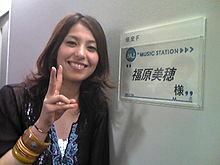- Miho Fukuhara
-
Miho Fukuhara
福原美穂
Fukuhara standing outside her dressing room before her performance on Music Station in 2008.Background information Birth name 福原 美穂 Born June 19, 1987[1] Origin Sapporo, Japan[1] Genres Pop, rock, R&B, Folk, Country Occupations Singer, model, spokesperson Years active 2006–present Labels Sony Music Japan Website [1] Miho Fukuhara (福原 美穂 Fukuhara Miho) is a Japanese pop star who made an indies debut in 2006, releasing a single titled "The Roots" and mini-album titled Step Out. In early 2008, she made her major-label debuted under Sony Music Entertainment Japan . Her debut single, "Change", was the number ninety-two yearly song on the Billboard Japan Hot 100 Singles year-end charts for 2008. With her single "Let It Out", she had her first major anime tie-in with Fullmetal Alchemist: Brotherhood.
Contents
Life and Music Career
Early Endeavors
Fukuhara, initially, was signed to the independent, local Sapporo-based Yumechika Records label and released her debut single and mini album, titled "The Roots" and Step Out respectively. She performed in-store lives to sell her records during 2006, which prompted Sony Music Japan to pick her up as a performing artist. Her first major-released appearance was on a Celine Dion Tribute album singing "Because You Loved Me".
Meager Beginnings & Rainbow
Taking the hot-seat in headlining her own career, she released her first single in early 2008 to varied success. Penning her own lyrics and co-producing the song, "Change" was a big hit in terms of radio airplay, reaching as high as the top 3, but only managing the 14th position in terms of sales. The single came in only one format, which is unusual for Japanese maxi singles in this age. She released her second single, "Himawari", to even more lackluster success than "Change". It failed to impact top 10 in terms of airplay and also only narrowly made the top 25 in the sales category. It wasn't until her third single, Yasashii Aka, that she had real major success. It was, first and foremost, her first single to be released in multiple formats. Although it was neither as strong on airplay or as a seller as "Change" was, it sold well digitally, and become her first single to become certified by the RIAJ. It was the number 17 song of December 2008 and quickly become certified gold. Her followup song, Love: Winter Song would match the success of "Yasashii Aka" similarly and ultimately surpass it, also going gold and becoming the number 10 song of January 2009.
She released her debut album Rainbow, which was mainly penned and co-produced by Fukuhara herself, in January, 2009, with "Yuki no Hikari" as the digital/radio single helping to promote the album. "Yuki no Hikari" peaked at #50 on the Japan Hot 100, becoming her lowest charting single. With strong label backing, however, the album peaked at #2 and was beat only by the successful 7th album by legendary pop-star Kumi Koda. Rainbow went on to sell nearly 100,000 copies and become certified gold by the Recording Industry Association of Japan. Fukuhara later embarked on the successful Rainbow Tour 2009, which spanned 6 shows spanning multiple cities. She performed a mix of covers, original songs from Rainbow, and b-sides.
Post-Rainbow
Following her debut album, she released her next single "Hanabi Sky" in June 2009. It was another major airplay hit, peaking at number 3. Overall, the single peaked at number 5, but only received number 26 for sales. She quickly announced her next single, "Let It Out", second ending theme to popular anime Fullmetal Alchemist: Brotherhood in early July. "Let It Out" is both Fukuhara's first major anime tie-in and her first single to be released in 3 separate formats, and was released on September 9, 2009. While it was a much bigger hit than "Hanabi Sky", it still fared relatively poorly in terms of both physical and digital sales in comparison to her previous singles "Love: Winter Song", "Change" and "Yasashii Aka".
Her next single, "Nande Nakitaku Nacchau n Darou" was set for release on December 12, 2009. The song's coupling song, "Cry No More", was described as a song which would make you cry.
Discography[1]
Albums
Release Title Weekly Peak Position Sales 2006 Step Out (EP) - - 2009 Rainbow 2 93,363 2010 Music Is My Life 5 21,564 2010 Regrets of Love (EP) - - 2011 THE SOUL EXTREME EP (EP) - - Singles
Release Title Peak
(Oricon)Peak
(Billboard)Sales Album 2006 "The Roots" - - - 2008 "Change" 14 4 25,086 "Rainbow" "Himawari" 24 15 6,438 "Yasashii Aka" 24 11 10,789 "Love: Winter Song" 14 10 20,954 2009 "Yuki no Hikari"1 — 50 — "Hanabi Sky" 26 5 3,601 "Music Is My Life" "Let It Out" 10 14 9,170 "Nande Nakitaku Nacchau n Darō" — — — 2010 "Mirai/Moshikashite" 33 — 3,430 1 Digital/Radio single
Certifications
- From Rainbow
-
- "Yasashii Aka"
- Japan Downloads certification: Gold (100,000)
- Japan Downloads certification: Gold (100,000)
Concerts
Concert Tours
2009: Rainbow Tour 2009
Notes and references
- ^ a b c Miho Fukuhara at Rate Your Music
External links
- official site (Japanese)
Singles "Change" · "Himawari" · "Yasashii Aka" · "Love (Winter Song)" · "Yuki no Hikari" · "Hanabi Sky" · "Let It Out" · "Nande Nakitaku Nacchau n Darou"Concerts "Rainbow Tour 2009"Categories:- 1987 births
- Living people
- Japanese female singers
- People from Sapporo
- Gr8! Records artists
- Sony Music Japan artists
Wikimedia Foundation. 2010.
